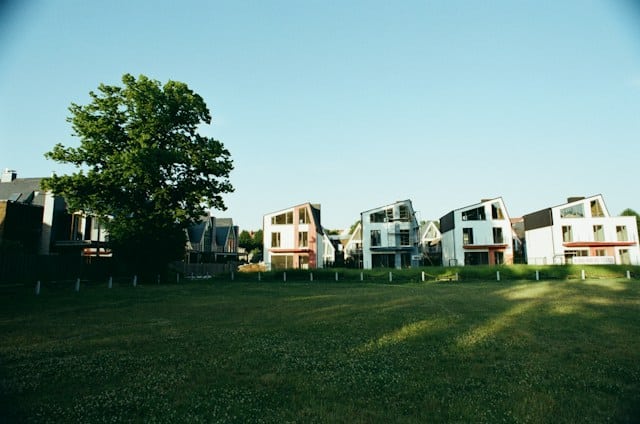In recent years, there has been a surge in the creation of ecovillages across the globe. These are intentional communities designed with environmental sustainability as a core principle. As you delve into this discussion, you’ll discover how these alternative living models are reshaping community living and sustainability practices, by redefining social values, promoting collective design, and encouraging local, eco-friendly changes.
Ecovillages: Redefining Social Values
Ecovillages are more than just a housing scheme; they are vibrant, self-sustaining communities that redefine social values. They offer an experiential glimpse into what sustainable living can look like when shared values, collective efforts, and a common vision come together.
A découvrir également : How do eco-friendly fashion brands influence consumer perceptions of sustainability?
The concept of an ecovillage is not new. It is rooted in an age-old tradition of community living where resources are shared, and individuals are bound by a common purpose. However, modern ecovillages have evolved to incorporate principles of environmental sustainability, social equality, and economic viability.
At the heart of an ecovillage is the community, a group of individuals who have chosen to live together in a way that respects the environment and promotes a sustainable lifestyle. The community is the lifeblood of the ecovillage, and it is through the community that social values are redefined.
A découvrir également : Can smart clothing enhance the healthcare monitoring of individuals?
Ecovillages promote values such as respect for nature, social justice, and self-sufficiency. These values are woven into the fabric of everyday life in the ecovillage, influencing everything from the architecture and landscape design to the social activities and governance structures.
Sustainable Design and Construction in Ecovillages
The physical design and construction of ecovillages are also instrumental in promoting sustainability. These intentional living communities utilize eco-friendly design and construction methods that drastically reduce their environmental impact.
Ecovillages often incorporate green building materials and technologies to create homes that are energy-efficient and environmentally friendly. This could mean using locally-sourced and recycled materials, installing solar panels, or incorporating passive heating and cooling techniques. The design of the ecovillages also maximizes the use of natural light and ventilation, further reducing energy consumption.
Collective design is another unique feature of ecovillages. Instead of individual homes, ecovillages are often made up of clusters of homes with shared communal spaces. This not only fosters a sense of community but also promotes resource-sharing and reduces waste.
Local, Eco-Friendly Changes: The Ecovillage Way
Living in an ecovillage involves more than just residing in an environmentally-friendly home. It’s about embracing a sustainable lifestyle that extends to every aspect of your daily life. These communities promote local, eco-friendly changes that can have a significant impact on the environment.
Food production is one such area where ecovillages often take a sustainable approach. Many ecovillages grow their own organic food, reducing their reliance on commercially-produced food that often comes with a hefty environmental footprint. This not only ensures that residents have access to fresh, nutritious food, but it also promotes skills like gardening and composting.
Transportation is another area where ecovillages promote sustainable practices. By encouraging cycling, walking, or carpooling, these communities reduce their carbon emissions and encourage healthier lifestyles.
Ecovillages as Hubs for Sustainability Education
The role of ecovillages extends beyond providing sustainable living options. They are often seen as hubs for sustainability education, serving as living labs where people can learn about eco-friendly practices.
Ecovillages offer a unique platform for sustainability education because they provide real-life, hands-on examples of sustainable practices in action. From renewable energy systems to organic gardening techniques, ecovillages are rich with opportunities for learning.
By hosting workshops, tours, and internships, ecovillages share their knowledge and inspire others to adopt sustainable practices. They play a crucial role in raising awareness about environmental issues and promoting sustainable solutions.
The Impact of Ecovillages on Broader Communities
As pioneers of sustainable living, ecovillages are influencing broader communities and inspiring change on a larger scale. Their impact extends beyond their boundaries, as they offer a tangible model of what a sustainable community can look like.
Ecovillages are challenging the conventional ways of living and offering a viable alternative that’s not only sustainable but also enriches the quality of life. As more people become aware of the environmental crisis that the world is facing, the interest in ecovillages and sustainable living is growing.
The practices and principles adopted by these eco-villages are influencing policies, urban planning, and architectural design in broader communities. They are serving as an example of how to incorporate sustainability at the heart of community living.
As a result, ecovillages are leading a cultural shift towards sustainability, reshaping community living practices, and setting new standards for a green, sustainable future.
Ecovillages: The Role of Shared Values and Community Participation
In the heart of an ecovillage, community participation is highly valued. It is the collective identity and shared values that bind these communities together and propel their sustainable living efforts forward. The essence of an ecovillage is its community members, who voluntarily decide to live together, sharing resources, and working towards common goals centered around environmental sustainability.
The members of these intentional communities believe in the power of shared values to bring about change. They see themselves as part of a larger global ecovillage network, connected by a common vision of a more sustainable future. This collective identity plays a pivotal role in empowering community members to participate actively in decision-making processes, from waste management strategies to the design of their eco-friendly homes.
By embracing the concept of shared values, ecovillages are challenging the individualistic nature of contemporary society. They are fostering a sense of collective responsibility for the environment, a characteristic that is integral to their long-term sustainability.
Despite the diversity in their geographical locations and cultural backgrounds, ecovillages worldwide share a common ethos. According to studies indexed on Google Scholar and Scholar Crossref, this ethos is centered on ecological sustainability, social-ecological integration, and community participation.
Ecovillages and Sustainable Development: Leading the Change
Ecovillages are not only redefining community living and sustainability practices; they are also contributing to the broader sustainable development agenda. By demonstrating that community-led, eco-friendly initiatives can significantly impact climate change, ecovillages are contributing to a more sustainable future.
Through their sustainable living practices, ecovillages are showcasing how communities can reduce their carbon footprint, promote biodiversity, and enhance resilience to environmental shocks. In this context, the role of ecovillages extends beyond their immediate communities. They are contributing to the broader discourse on sustainable development and influencing policy decisions at the local, national, and even international levels.
Research papers available on preprints.org and other open access platforms underscore the potential of ecovillages as catalysts for sustainable development. These studies highlight how ecovillages, through their innovative practices and community participation, are setting new benchmarks for sustainability, thus influencing policies and planning at larger scales.
Conclusion: Ecovillages – Pioneering a Sustainable Future
In conclusion, ecovillages are playing a pivotal role in reshaping community living and sustainability practices. Rooted in shared values and community participation, these intentional communities are offering a glimpse into what a sustainable future could look like.
They are inspiring change not only within their boundaries but also in broader communities. As ecovillages continue to grow and evolve, they are influencing policies, urban planning, and architectural design, and leading a cultural shift towards sustainability.
More than merely a green alternative to traditional housing, ecovillages represent a profound transformation in how we perceive and interact with the environment. They are a testament to the potential of collective action and shared values in tackling pressing environmental challenges.
In the face of escalating climate change, the ecovillage model offers a sustainable blueprint for communities worldwide. It is a concrete, lived example of how we can align our lifestyles with the ecological limits of our planet, fostering a future that is not only sustainable but also equitable and resilient.











